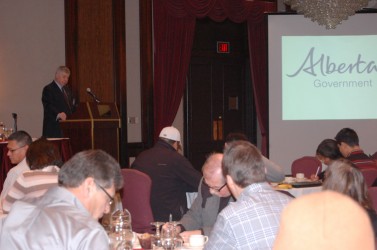Article Origin
Volume
Issue
Year
Aboriginal Relations Minister Robin Campbell has made it clear: his government will not be considering resource revenue sharing with First Nations.
Campbell addressed a group of Chiefs and representatives from First Nations from Alberta and Saskatchewan at the Western Aboriginal Consultation and Negotiation forum on Jan. 29, pledging that his government would “no longer … accept the status quo. Instead we will work together to make sure Alberta’s First Nations, Métis and Inuit are full participants in Alberta’s success.”
But when asked if that full participation included a share in revenues from resources, Campbell said, “At this point no.”
The Alberta government has joined its provincial counterpart in Saskatchewan in reiterating its position that resource revenue sharing is not on the table.
“I’m not surprised,” said Cameron Alexis, newly elected Regional Chief for Alberta for the Assembly of First Nations. “The Conservative government has had 40 years to do right and unfortunately we are still here 40 years later, still negotiating with the Conservative government of Alberta.”
“It’s the same old same old from the province,” said Athabasca Chipewyan First Nation Chief Allan Adam. “Why not give us a piece of the revenue that comes from our traditional territory? We could fund our programs and services, no different than (how) any other municipality or big cities benefit from the resources that come from our area.”
But Campbell holds that First Nations in Alberta benefit from the revenue that comes from the province’s resources the same way other Albertans benefit. He also noted that Alberta, as a “have province,” nets $21 million to the federal government every year.
“We’re not going to take a share of our resource revenues and give it to First Nations,” he said.
But as far as working with First Nations to make the consultation process more effective when it comes to industrial development on traditional land, the province is on board with that.
To address the issue of adequate funding which would allow First Nations to participate more fully in the consultation process, the government is proposing implementing an industry levy. The levy would be “strictly for consultation activities,” said Campbell, with the levy paid to the government, which would in turn distribute it to First Nations to ensure that the consultation process is “solely focused on potential impact on treaty right and potential uses.”
An industry levy is not supported by Adam or Alexis.
“I think each Nation has every right to negotiate and go down the path of consultation processes that some already have in place with their regional industry partners and I think that’s a sovereign issue,” said Alexis.
The provincial government is calling for a centralized consultation office, which would act as an oversight body, and a process matrix.
“Simply put (the process matrix) would categorize the effect of industrial activities then that would categorize the level of consultation required,” said Campbell.
“We think it’s important that we bring First Nations, industry and all stakeholders together as we need to find some common ground to make a good policy paper that we will use to start our draft policy process,” he said.
The draft policy is scheduled to be released in spring 2013, with the final policy to be passed later in the year.
“Improving the consultation process is key to the province fulfilling its legal obligations to First Nations, but I think more importantly, improving relations. An improved consultation process will deliver a stronger outcome for Alberta,” said Campbell.
Alexis is not ready to let the discussion drop despite Campbell’s stand.
“Certainly there’s going to be a lot of dialogue, continued discussions and perhaps negotiations and I think the minor crown has got to respect the Supreme Court rulings, the highest court in the land. They’ve got to respect it and we’ve got to find some common ground,” said Alexis.
Adam goes a step further, reiterating his charges of a racist government.
“Regardless of whatever way (Campbell) does his work, I think the First Nations are going to have to start putting more pressure on the Alberta government. This government is nothing but a racist government. The fact remains that First Nations always believed that the Conservative government were always racist toward First Nations issues. It just goes to show they’ve had their way for too long and regardless of whatever government is formed, they will always keep that same momentum going,” said Adam.
“I don’t think our forefathers signed the treaty to give up all our resources,” he added.
- 4833 views

